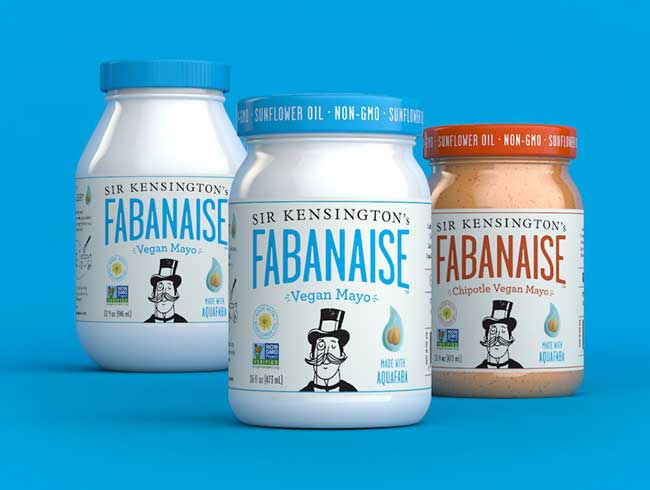The New Vegan Mayo and Chatting About Wine Trends
NEW PRODUCT EXPLORATIONS (Online Exclusive)

In this edition of New Product Explorations, we look at a new use for a waste product and check out what’s happening in wine.
 A New Vegan Mayo
A New Vegan Mayo
At the 2017 National Restaurant Assoc. Show, better-for-you condiment maker Sir Kensington’s showcased its Fabanaise, a vegan mayonnaise alternative made with a hot new ingredient with a long history: aquafaba, or chickpea cooking liquid.
The vegan mayo market is hot: as of May 2016, sales had reached $34 million, up from $25 million in the year prior, according to Spins data presented by The New York Times. While consumers have had access to vegan mayos for some time, those versions relied on pea and soy proteins as egg replacers. When developing their own version, the Sir Kensington’s team wasn’t satisfied with the results they were getting from these ingredients. According to the company, about two years ago, the R&D team stumbled upon a post on food blog Food52 about using aquafaba as an egg white replacer in vegan dishes.
The team was desperate enough to try using aquafaba to replace yolks, too, and the team was happier with its first batch of the aquafaba recipe than the 200th iteration of the pea protein version. Since that discovery, Sir Kensington’s has created its own supply chain to procure the aquafaba, rather than relying on the waste stream from chickpea processing as it had been.
The company expects to see more companies using this versatile ingredient, even if consumers don’t necessarily understand what it is yet; to most people, “the ‘faba’ in Fabanaise stands for ‘fabulous,’” explained a company representative at the show.
Wines on Wine
Coopers Hawk master sommelier Emily Wines shares some insight into the latest trends in the world of wine.
 • On the Next Rosé. “Rosé has gotten really hot,” she says, which she thinks is “pretty awesome.” It’s even taken on frozen forms—“frosé”—and has been a way for wine drinkers to break down some of the taboos that have been associated with the seriousness of wine.
• On the Next Rosé. “Rosé has gotten really hot,” she says, which she thinks is “pretty awesome.” It’s even taken on frozen forms—“frosé”—and has been a way for wine drinkers to break down some of the taboos that have been associated with the seriousness of wine.
Chilled wine like rosé is especially popular in the summer, she notes. For consumers who might be rosé-d out, Wines suggests they turn to her current at-home favorite varietal next summer. Lambrusco is a lightly sparkling Italian red that’s served chilled. While in the past these wines have tended to be sweeter, “incredible” drier options are now available. “It’s quaffable and cheap,” she says.
• On Canned Wine. A lot of wineries are experimenting with wines in cans, says Wines. “People don’t really feel like they need to follow the rules” when it comes to how wines are consumed, she says. Canned wines are not meant to be cellared or stored for a long time, but Wines notes that most shoppers consume any wines they buy within three days of purchase, so the packaging should not contribute any loss of quality.
Wines says that it is important, however, for manufacturers to consider the flavor profile of the wines they are canning; drinkers lose the aromatics they would otherwise encounter when sipping vino out of a glass, so the wine should not be overly nuanced or complex. Fruity, simple, fresh, and clean flavors work well in cans, she says. She doesn’t expect that superpremium wineries will can their wares, though—those wines are still a luxury commodity, she says, and are “thinking” wines, not drinking wines.
• On Wine on Tap … and in Boxes. Coopers Hawk serves all of its white wines on tap, and Wines says more upscale wineries are providing on-tap options that preserve the freshness of the wine by preventing air from oxidizing it and reduce glass needed for bottling. This process also provides consistency and smoothness from glass to glass, she says.
Boxed wine, though, is still struggling to find its place, says Wines. It’s not that the technology isn’t good—the bags inside wine boxes prevent air from entering just as a keg would, but boxed wine still suffers from a consumer perception that it isn’t all that good. There’s a lot of potential here for respected brands to go all in on boxes and elevate the reputation of the genre, she thinks.
